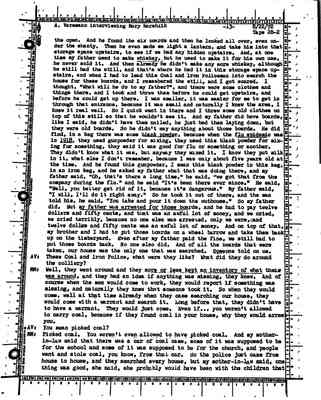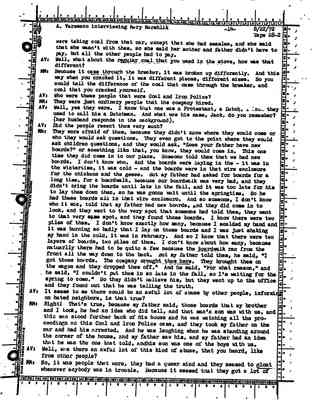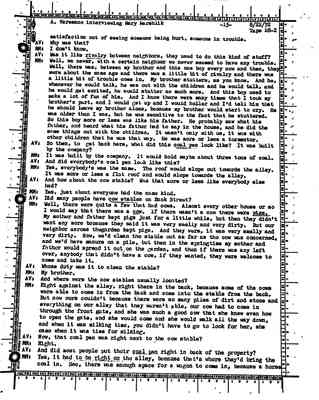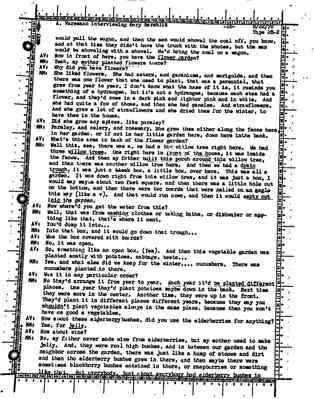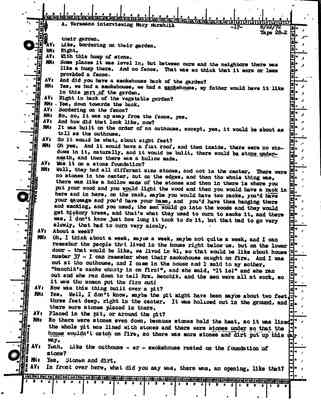Pages
45
A. Varesano interviewing Mary Marshlik -13- 8/22/72 Tape 28-2 the open. And he found the six boards and then he looked all over, even under the shanty. Then he even made me light a lantern, and take him into that storage space upstairs, to see if we had any hidden upstairs. And, at one time my father used to make whiskey, but he used to make it for his own use, he never sold it. And then already he didn't make any more whiskey, althrough he still had the still, and that's where he had it in this storage space upstairs, and when I had to lead this Coal and Iron Policeman into search the house for these boards, and I remembered the still, and I got scared. I thought, "What will he do to my father?", and there were some clothes and things there, and I took and threw them before he could get upstairs, and before he could get up there. I was smaller, it was easier for me to get in through that entrance, because it was small and naturally I knew the area. I knew it real well. So I quick went in there and I threw some old clothes on top of this still so that he wouldn't see it. And my father did have boards, like I said, he didn't have them nailed, he just had them laying down, but they were old boards. So he didn't say anything about those boards. He did find, in a keg there was some black powder, because when the flu epidemic was in 1918, they used gunpowder for mixing, they used this black powder for mixing for something, they said it was good for flu or something or another. They didn't know what it was, but anyway they mixed it. I know they put milk in it, what else I don't remember, because I was only about five years old at the time. And he found this gunpowder, I mean this black powder in this keg, in an iron keg, and he asked my father what that was doing there, and my father said, "Oh, that's there a long time," he said, "we got that from the company during the flu." and he said "It's been there ever since." He said, "Well, you better get rid of it, because it's dangerous." My father said, "I will, I'll do it right away." So he took it out of there, and the man told him, he said, "You take and pour it down the outhouse." So my father did. But my father was arrested for those boards, and he had to pay twelve dollars and fifty cents, and that was an awful lot of money, and we cried, we cried terribly, because no one else was arrested, only we were, and twelve dollars and fifty cents was an awful lot of money. And on top of that, my brother and I had to put those boards on a wheel barrow and take them back up on the timberyard. Even after my father paid the fine, we still had to put the boards back. No one else did. And of all the boards that were taken, our house was the only one that was searched. Someone told on us. AV: These Coal and Iron Police, what were they like? What did the do around the colliery? MM: Well, they went around and they more of less kept an inventory of what the was around, and they had an idea if anything was missing, they knew. And of course when the men would come to work, they would report if something was missing, and naturally they knew that someone took it. So when they would come, well at that time already when they came searching our house, they would come with a warrant and search it. Long before that, they didn't have to have a warrant. They would just come. Even if...you weren't allowed to carry coal, because if they found coal in your house, why they would arrest you. AV: You mean picked coal? MM: Picked coal. You weren't even allowed to have picked coal. And my mother-in-law said that there was a car of coal came, some if it was supposed to be for the school and some of it was supposed to be for the church, and people went and stole coal, you know, from that car. So the police just came from house to house, and the searched every house, but my mother-in-law said, one thing was good, she said, she probably would have been with the children that
46
A. Varesano interviewing Mary Marshlik -14- 8/22/72 Tape 28-2
were taking coal from that car, except that she had measles, and she said that she wasn't with them, so she said her mother and father didn't have to pay, but all the other people had to pay. AV: Well, what about the regular coal that you used in the stove, how was that different? MM: Because it came through the breaker, it was broken up differently. And this way when you cracked it, it was different pieces, different sizes. So you could tell the difference of the coal that came through the breaker, and coal that you cracked yourself. AV: Who were these people that were Coal and Iron Police? MM: They were just ordinary people that the company hired. AV: Well, yes they were. I know that one was a Protestant, a Dutch. And they used to call him a Dutchman. And what was his name, Jack, do you remember? (her husband responds in the background). AV: Did the people resent them very much? MM: They wore afraid of them, because they didn't know where they would come or who they would ask questions. They even got to the point where they would ask children questions, and they would ask, "Does your father have new boards?" or soemthing like that, you know, they would come in. This one time they did come in to our house. Someone told them that we had new boards. I don't know who. And the boards were laying in the - it was in the wintertime, it was cold - and the boards were in that wire enclosure for the chickens and the geese. But my father had asked for boards for a long time, for a boardwalk, because our boardwalk was very bad, and they didn't bring the boards until late in the fall, and it was too late for him to lay the boards all in that wire enclosure. And so someone, I don't know who it was, told that my father had new boards, and they did come in to look, and they went to the very spot that someone had told them, they went to that very same spot, and they found those boards. I know there were two piles of them. I don't know exactly how many, because I scalded my hand and it was burning so badly that I lay on those boards and I was just shaking my hand in the cold, it was in February. And so I don't know that there were two layers of boards, two piles of them. I don't know about how many, because naturally there had to be quite a few because the boardwalk ran from the front all the way down to the back. But my father told them, he said, "I got those boards. The company brought them here. They brought them on the wagon and they dropped them off." And he said, "For what reason," and he said, "I couldn't put them in so late in the fall, so I'm waiting for the spring to come." So they didn't believe him, but the went up to the office and they found out that he was telling the truth. AV: It seems to me there could be an awful lot of abuse by other people, informing on hated neighbors, is that true? MM: Right! That's true, because my father said, those boards that my brother and I took, he had an idea who did tell, and that man's son was with us, and this man stood further back of his house and he was watching all the proceedings as this Coal and Iron Police came, and they took my father on the car and had him arrested. And he was laughing when he was standing around the corner of the house, and my father saw him, and my father had an idea that he was the one that told, and his sone was one of the boys with us. AV: Well, was there an awful lot of this kind of abuse, that you heard, like from other people? MM: No, it was people that were, they had a queer mind and they seemed to gloat whenever anybody was in trouble. Because it seemed that they got a lot of
47
A. Varesano interviewing Mary Marshlik -15- 8/22/72 Tape 28-2
satisfaction out of seeing someone being hurt, someone in trouble. AV: What was that? MM: I don't know. AV: Was it like rivalry between neighbors, they used to do this kind of stuff? MM: Well, we never, with a certain neighbor we never seemed to have any trouble. Well, there was, between my brother and this one boy every now and then, they were about the same age and there was a little bit of rivalry and there was a little bit of trouble come in. My brother stutters, as you know. And he, whenever he would talk, he was out with the children and he would talk, and he would get excited, he would stutter so much more. And this boy used to make a lot of fun of him. And I know there were many times that I took my brother's part, and I would get up and I would holler and I'd tell him that he should leave my brother alone, because my brother would start to cry. He was older than I was, but he was sensitive to the fact that he stuttered. So this boy more or less was like his father. He probably saw what his father, and heard what his father had to say in the house, and he did the same things out with the children. It wasn't only with us, it was with other children that he was that way. He was more or less a tormentor. AV: So then, to get back here, what did this coal pen look like? It was built by the company? MM: It was built by the company. It would hold maybe about three tons of coal. AV: And did everybody's coal pen look like this? MM: Yes, everybody's was the same. The roof would slope out towards the alley. It was more of less a flat roof and would slope towards the alley. AV: And how about the cow stable? Was that more or less like everybody else had? MM: Yes, just about everyone had the same kind. AV: Did many people have cow stables on Back Street? MM: Well, there were quite a few that had cows. Almost every other house or so I would say that there was a cow. If there wasn't a cow there were pigs. My mother and father kept pigs just for a little while, but then they didn't want any more because they said it was very smelly and very dirty. But our neighbor across thegarden kept pigs. And they were, it was very smelly and very dirty. Now, we'd clean the stable out as far as the cow was concerned, and we'd have manure on a pile, but then in the springtime my mother and father would spread it out on the garden, and then if there were any left over, anybody that didn't have a cow, if the wanted, they were welcome to come and take it. AV: Whose duty was it to clean the stable? MM: My brother. AV: And where were the cow stables usually located? MM: Right against the alley, right there in the back, because some of the cows were able to come in from the back an dcome into the stable from the back. But now ours couldn't because there were so many piles of dirt and stone and everything in our alley that they weren't able, our cow had to come in through the front gate, and she was such a good cow that she knew even how to open the gate, and she would come in and she would walk all the way down, and when it was miling time, you didn't have to go to look for her, she came when it was time for milking. AV: Now, that coal pen was right next to the cow stable? MM: Right. AV: And did most people put their coal pen right in back of the property? MM: Yes, it had to be right on the alley, because that's where they'd bring the coal in. See, there was enough space for a wagon to come in, because a horse
48
A. Varesano interviewing Mary Marshlik -16- 8/22/72 Tape 28-2
would pull the wagon, and then the men would shovel the coal off, you know, and at that time they didn't have the truck with the shutes, but the man would be shoveling with a shovel. He'd bring the coal on a wagon. AV: Now in front of here, you have the flower garden? MM: Yeah, my mother planted flowers there? AV: Why did you have flowers? MM: She liked flowers. She had asters, and geraniums, and marigolds, and then there was one flower that she used to plant, that was a perennial, that grew from year to year. I don't know what the name of it is, it reminds you something of a hydrangea, but it's not a hydrangea, because each stem had a flower, and they'd come in a dark pink and lighter pink and in white. And she had quite a few of those, and then she had pansies. And stawflowers. And she grew a lot of strawflowers and she dried them for the winter, to have them in the house. AV: Did she grow any spices, like parsley? MM: Parsley, and celery, and rosemary. She grew them either along the fence here, in her garden, or if not in her little garden here, down here inthe back. AV: What's this area in back of the flower garden? MM: Well this, see, there was a, we had a big willow tree right here. We had three willow trees. One right here in front of the house, it was inside the fence. And then my father built this porch around this willow tree, and then there was another willow tree here. And then we had a drain trough, it was just a black box, a little box, over here. This was all a garden. It was down right from this willow tree, and it was just a box, I would say maybe about two feet square, and then there were nailed on an angle this way (like a v). And that would run down, and then it would empty out into the garden. AV: Now where'd you get the water from this? MM: Well, that was from washing clothes or taking baths, or dishwater or anything like that, that's where it went. AV: You'd dump it into... MM: Into that box, and it would go down that trough... AV: Was the box covered with boards? MM: No, it was open. AV: So, something like an open box. (Yes). And then this vegetable garden was planted mostly with potatoes, cabbage, beets... MM: Yes, and what else did we keep for the winter...cucumbers. There was cucumbers planted in there. AV: Was it in any particular order? MM: No they'd arrange it from year to year. Each year it'd be planted different places. One year they'd plant potatoes maybe down in teh back. Next time they were more in the center. Another time, they were up in the front. They'd plant it in different places different years, because they say you shouldn't plant vegetables always in the same place, because then you won't have as good a vegetables. AV: How about these elderberry bushes, did you use the elderberries for anything? MM: Yes, for jelly. AV: How about wine? MM: No, my father never made wine from elderberries, but my mother used to make jelly. And, they were real high bushes, and in between our garden and the neighbor across the garden, there was just like a hump of stones and dirt and then the elderberry bushes grew in there, and then maybe there were sometimes blackberry bushes entwined in there, or raspberries or something like that. But everybody, just about everybody had elderberry bushes in
49
A. Varesano interviewing Mary Marshlik -17- 8/22/72 Tape 28-2
their garden. AV: Like, boardering on their garden. MM: Right. AV: With this hump of stone. MM: Some places it was level in, but between ours and the neighbors there was like a hump there. And no fence. That was so thick that it more or less provided a fence. AV: And did you have a smokehouse back of the garden? MM: Yes, we had a smokehouse, we had a smokehouse, my father would have it like in this part of the garden. AV: Right in back of the vegetable garden? MM: Yes, down towards the back. AV: Boardering on the fence? MM: No, no, it was up away from the fence, yes. AV: And how did that look like, now? MM: It was built on the order of an outhouse, except, yes, it would be about as tall as the outhouse. AV: So it would be what, about eight feet? MM: Oh yes. And it would have a flat roof, and then inside, there were no windows in it, naturally, and it would be built, there would be stone underneath, and then there was a hollow made. AV: Was it on a stone foundation? MM: Well, they had all different size stones, and not in the center. There were no stones in the center, but on the edges, and then the whole thing was, there was like a hollow made of the stones and then in there is where you put your wood and you would light the wood and then you would have a rack in here and in here, on the rack, maybe you would have two racks, you'd have your sausage and you'd have your ham, and you'd have them hanging there and smoking, and you used, the men would go into the woods and they would get hickory trees, and that's what they used to burn to smoke it, and there was, I don't know just how long it took to do it, but that had to go very slowly, that had to burn very slowly. AV: About a week? MM: Oh, I think about a week, maybe a week, maybe not quite a week, and I can remember the people that lived in the house right below us, but on the lower door - that would be like, we lived in 41, so that would be like about house number 37 - I can remember when their smokehouse caught on fire. And I was out at the outhouse, and I came in the house and I said to my mother, "Henchik's smoke shanty in on fire!", and she said, "It is!" and she ran out and she ran down to tell Mrs. Henchick, and the men were all at work, so it was the women put the fire out! AV: Now was this thing built over a pit? MM: Yes. Well, I don't know, maybe the pit might have been maybe about two feet, three feet deep, right in the center. It was hollowed out in the ground, and there were stones placed in there. AV: Placed in the pit, or around the pit? MM: No there were stones even down, because stones held the heat, so it was lined the whole pit was lined with stones and there were stones under so that the house wouldn't catch on fire, so there was more stones and dirt put up this way. AV: Yeah. Like the outhouse - er - smokehouse rested on the foundation of stone? MM: Yes. Stones and dirt. AV: In front over here, what did you say was, there was, on opening, like that?
